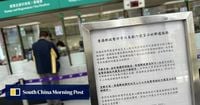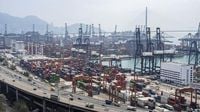HONG KONG — In a significant shift amid escalating trade tensions, Hongkong Post announced on April 16, 2025, that it will cease shipping small parcels to the United States due to new tariffs imposed by the U.S. government. This decision follows President Trump’s recent directive to eliminate a customs exception that previously allowed small-value shipments from Hong Kong to enter the U.S. without incurring taxes.
Beginning May 2, 2025, a hefty 120% tariff will be applied to parcels valued under $800, a change that has prompted Hongkong Post to suspend the acceptance of non-airmail parcels destined for the U.S. with immediate effect. Airmail parcels will continue to be accepted until April 27, 2025, after which all shipments containing goods will be halted.
“For sending items to the U.S., the public in Hong Kong should be prepared to pay exorbitant and unreasonable fees due to the U.S.'s unreasonable and bullying acts,” the postal service stated in a public announcement. This suspension marks a reaction to the broader trade conflict between China and the U.S., which has seen tariffs on Chinese imports skyrocket from 54% to 145% in recent months.
Hong Kong, a former British colony that returned to Chinese sovereignty in 1997, has historically maintained a separate customs policy from mainland China. However, the U.S. government has begun treating Hong Kong as part of China following the implementation of a national security law in 2020, which has drawn widespread criticism and led to the revocation of the city’s special trading status.
In 2023, the value of goods shipped from Hong Kong to the U.S. reached approximately $34.8 billion, accounting for about 6.5% of the city’s total exports. Total trade between the two regions amounted to $60.3 billion, making the U.S. Hong Kong’s third-largest trading partner. The abrupt halt to parcel shipments could have significant implications for local businesses and consumers who rely on international trade.
Hongkong Post has indicated that it will contact senders of parcels that have not yet been shipped to arrange for their return and provide refunds starting April 22, 2025. Notably, mail containing only documents will remain unaffected by this new policy.
This latest development comes amidst a broader context of international trade disputes that have seen the U.S. and China imposing retaliatory tariffs on each other's goods. The Trump administration's decision to close the loophole allowing duty-free shipping has been met with fierce criticism from Hong Kong officials, who argue that it undermines the city's status as a free port.
“The U.S. is unreasonable, bullying and imposing tariffs abusively,” Hongkong Post reiterated in its statement. The postal service's suspension of shipments is not only a reflection of the immediate economic consequences of these tariffs but also highlights the increasingly fraught relationship between the U.S. and China.
As the trade war escalates, experts warn that the ramifications could extend far beyond Hong Kong, affecting global shipping routes and international commerce. Ben Kostrzewa, a trade expert at Hogan Lovells in Hong Kong, noted, “Avoiding charging the U.S. fees and duties in Hong Kong preserves the city’s status as a free port. But the suspension makes it more challenging for the trade and shipping businesses in Hong Kong.”
The ongoing tensions have also led to a rise in anti-American sentiment among some Hong Kong officials, who perceive the U.S. actions as an infringement on the city’s autonomy. Xia Baolong, a top Chinese official overseeing Hong Kong affairs, condemned the U.S. tariffs as “extremely shameless” and accused Washington of attempting to “take away Hong Kong’s life.”
In the wake of these developments, Hong Kong's government has expressed frustration with the U.S. administration's policies, which they argue treat the city as indistinguishable from mainland China. The implications of this shift could reverberate through the global economy, as businesses and consumers alike grapple with the reality of increased shipping costs and barriers to trade.
As the situation continues to evolve, Hong Kong's postal service is urging residents to prepare for the financial impact of these changes. The move to suspend parcel shipments is a clear indication of the challenges faced by the city as it navigates the complexities of international trade amid a backdrop of geopolitical tensions.
With the U.S. and China locked in a fierce trade war, the future of Hong Kong’s role as a global trading hub hangs in the balance. The city’s unique position as a bridge between East and West is being tested, and the outcome of this latest tariff battle could have lasting effects on its economy and international standing.
As the deadline for the new tariffs approaches, businesses in Hong Kong are left to ponder the future of their operations and the potential costs associated with sending goods to the United States. The suspension of postal services marks a significant turning point in the trade relationship between the two regions, and many are left wondering what the next steps will be in this ongoing saga.
In these uncertain times, the residents of Hong Kong are urged to stay informed and prepared for the changes that lie ahead, as the impacts of U.S. tariffs begin to take shape in the local economy. The situation remains fluid, and all eyes will be on how both sides respond in the coming weeks and months.







